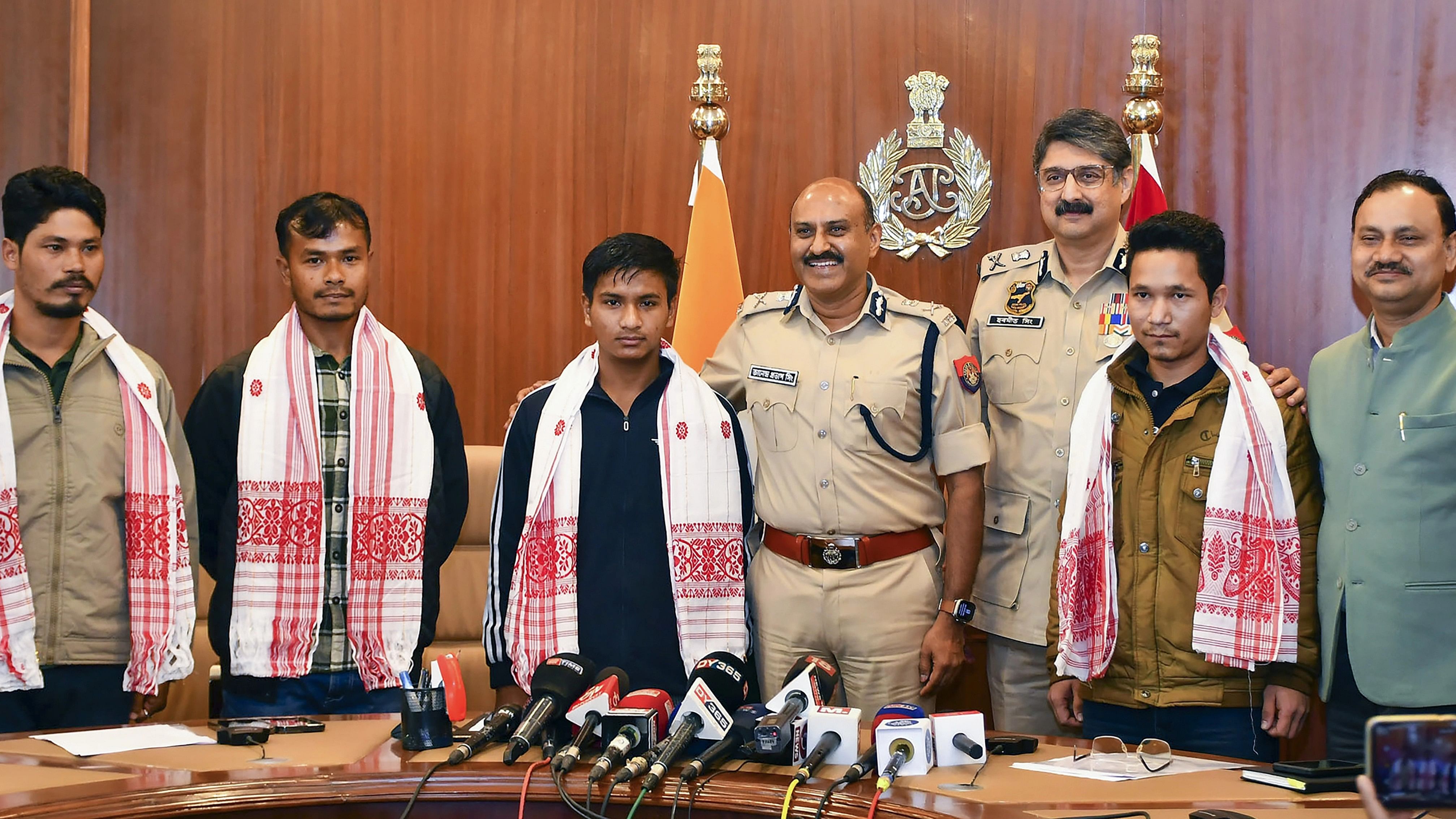
United Liberation Front of Asom-Independent (ULFA-I) members surrender before DGP Assam G P Singh, at Assam Police Headquarters in Guwahati, Wednesday, Nov. 29, 2023.
Credit: PTI Photo
Guwahati: More than 8,000 cadres of major insurgent groups, barring Ulfa, in Assam have joined the "mainstream" by signing agreements with the government in the past two-and-half years.
The Armed Forces (Special Powers) Act, too, has been withdrawn from the state, barring in four districts, owing to the lowest number of insurgency-related incidents since insurgency began in Assam with the the birth of United Liberation Front of Assam (Ulfa) in 1979.
Three bomb blasts carried out by Ulfa-Independent, thefaction led by fugitive Paresh Baruah, however, have put the spotlight on the outfit, which has remained the only major hurdle in Assam's over four decades-long quest to establish "complete peace."
After a lull, Ulfa-I struck again on November 22 by triggering a blast near an arm installation in eastern Assam's Tinsukia district, where the AFSPA is still in force.
Two similar blasts took place in neighbouring Sibsagar and Tinsukia district this month. While claiming responsibility for the explosions, the Ulfa-I said that the same was done in response to Assam director general of police, GP Singh's attempts to call the long Ulfa conflict only a law and order issue.
"The conflict is political and it can only be addressed politically," the Ulfa-I said on December 15, hours after it triggered a blast in front of the gate of an army camp in Jorhat district, also in eastern Assam. No one was injured in the blast. The blasts followed a war of words between Singh and the outfit while the BJP-led government in the state decided to hand over the cases to the NIA.In fact, the Ulfa-Independent has still remained the only major hurdle before Assam's over four-decades-old quest for establishing "complete peace."
Ulfa-I's strength: Former director general of Assam police, Mukesh Sahay told DH on Monday that although Ulfa-I has weakened considerably over the years, Paresh Baruah is constantly trying to keep it active probably with the help of agencies "inimical to India." Constant action by the security forces and development initiatives taken by the government marginalised the outfit and led to decrease in public support.
Journalist Rajeev Bhattacharyya, who recently published his book, ULFA--the Mirage of Dawn, said the outfit has nearly 300 cadres at present but they are capable of carrying out attacks, which could be easier for them in eastern Assam than in the western part.
"The intelligence gathering mechanism of the security forces has vastly improved compared to the situation two decades ago which makes the task of the outfit difficult. Still, there are gaps for the rebels to sneak in and execute operations," he told DH.
Bhattacharyya had visited the camps of Ulfa-I and NSCN-K and interviewed several leaders including Baruah, too. Baruah is believed to be taking shelter somewhere along the Myanmar-China border, which is closer to eastern Assam districts like Sivasagar, Charaideo, Tinsukia and Jorhat. The government extended the AFSPA in the four districts as those are still considered to be Ulfa-I's strongholds.
Peace talks: Although Ulfa-I called the long conflict a political one, the outfit has rejected the government's calls for talks without discussion on its core demand for "sovereign Assam."
The government rejected the outfit's condition. Himanta Biswa Sarma, who appealed to the outfit to join peace talks several times since he became the CM in May 2021, also admitted that Ulfa-I is the only hurdle in the government's efforts to end decades-old insurgency problem in Assam.
Tribal insurgency has ended after the Bodoland, Karbi Anglong and Dima Hasao-based outfits joined the mainstream by signing accords in the past two-years. We are hopeful about signing an agreement with the pro-talks faction of Ulfa also soon.
But Ulfa-I has remained the only hurdle in our path to complete peace," Sarma said, recently. As the efforts to convince Ulfa-I to join talks yielded no result, Sarma on Sunday said there is a need to sit with "all stakeholders" to find ways on how to move forward for talks with Ulfa-I. The Rajkhowa-led faction joined the peace talks in 2011 after the top leaders were "pushed back" from neighbouring Bangladesh and were subsequently arrested. Rajkhowa faction, meanwhile, is likely to sign an agreement with the government before the 2014 Lok Sabha elections.